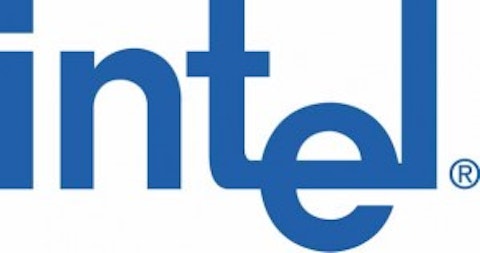Evercore Partners tech analyst Patrick Wang recently said that ARM Holdings plc (ADR) (NASDAQ:ARMH) is expected to benefit from Apple Inc. (NASDAQ:AAPL)’s introduction of the first 64-bit ARM Holdings plc (ADR) (NASDAQ:ARMH)-based chip this year. Wang added, “This bodes well for ARMH as v8 designs drive richer royalty rates.”
ARM recently introduced its first 64-bit Cortex-A50 series processor designs as the company tries to preserve its dominance in smartphones and tablets, while catching up with Intel Corporation (NASDAQ:INTC) in servers. In this post I will dig deeper into ARM’s prospects in the 64-bit game.

Why 64-bit?
64-bit processors were first introduced in 1992, but they’ve been used meaningfully since the past few years. Both Intel and Advanced Micro Devices (NYSE:AMD) have introduced 64-bit chips. 64-bit processors have 64-bit ALUs, 64-bit registers, and 64-bit buses.
One reason why the world wants to embrace 64-bit processors is because of their enlarged address spaces. 32-bit chips are often constrained to a maximum of 2GB or 4GB of RAM access. That may sound like a lot for most home computers. However, a 4GB limit can be a severe problem for server machines and machines running large databases. Even home machines will start bumping up against the 2GB or 4GB limit pretty soon if the current trend continues. A 64-bit chip has none of these constraints, because a 64-bit RAM address space is essentially infinite for the foreseeable future.
ARM’s A57 and A53 SoC processors
Successors to the current generation Cortex-A15, the Cortex-A50 series system-on-chips brings the ARM Holdings plc (ADR) (NASDAQ:ARMH) architecture into a 64-bit capable processor that can be used in a much broader range of devices — from smartphones to data center workhorses. The Cortex-A57, specifically, is the series’ flagship, and will be a serious entry into the server market.
While ARM processors with 32-bit support have a ceiling of 4GB of memory, current systems with the new ARM processors are being configured to support up to 64GB of memory. Moreover, the hardware-level security features of these processors can be used to authorize mobile transactions without additional tools.
ARM licenses architecture and processor designs to chip companies, which then make the chips that go into tablets, smartphones, and servers. The first Cortex A50-series chips could be available in late 2013, after which companies can start making products. Servers may be the first products to reach the market, and some chip partners are aggressively looking at high-end smartphones and tablets. Ian Forsyth, product manager at ARM, said:

